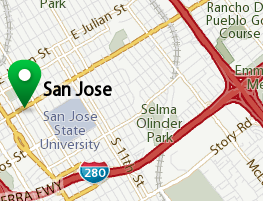Google Maps Competitor deCarta Benefitting From Google Fees
Later this morning Google is going to hold an event to update us on the current state of all things Google Maps. This is widely seen as a pre-emptive PR strike of sorts against Apple. Next week Cupertino is potentially going to announce its own advanced mapping service as an integral part of iOS 6. […]

Even as Google Maps celebrates its dominance an ubiquity in the world of local search and third party services all is not ponies and sunshine. Last Fall Google announced that it would be charging its heaviest Maps users for map views/impressions over 25,000 per day. Each additional 1,000 page loads would cost $4.
That promoted a number of publishers and developers, most notably Foursquare, as well as number of smaller companies to seek out alternatives. OpenStreetMap has been the highest profile beneficiary of some of these defections. (It’s a bit of a surprise that Microsoft has not been more aggressive in wooing developers to Bing Maps.)
Another apparent beneficiary of Google’s move to charge for Maps users is deCarta. The mapping and geo-services provider said in a blog post that “In the last 90 days, we have had 488 new companies sign up on the deCarta DevZone and start working with our offerings.”
Source: deCarta developer survey
The company surveyed developers and found out a number of things about what’s going on in the market:
- More than 50 percent of the new developers on its platform were defections from Google Maps (graphic above)
- Many of those developers were not financially impacted by the fees; however they wanted predictability and stability in their mapping product
- Some said they were also seeking differentiation with an alternative mapping UI
- Developers expressed a need for more services than what Google was offering
- They also wanted different data sets to choose from (deCarta apparently offers/supports multiple local data sets)
While Google remains the dominant mapping platform used by publishers and developers for mapping services, it is likely to now face much more competition. In particular it will be interesting to see what Apple offers and how enticing it is for developers to integrate into their apps.
As mentioned, there’s also an opportunity for Bing, Nokia/Navteq and certainly even Mapquest, itself once in the position of Google Maps as the market leader, to be more aggressive and attract developers and publishers away from Google Maps. It’s not clear whether Google’s larger competitors will be able to capitalize on the opening.
Smaller entities such as OpenStreetMap and deCarta do appear to be however.
Related Entries
Opinions expressed in this article are those of the guest author and not necessarily Search Engine Land. Staff authors are listed here.
Related stories
